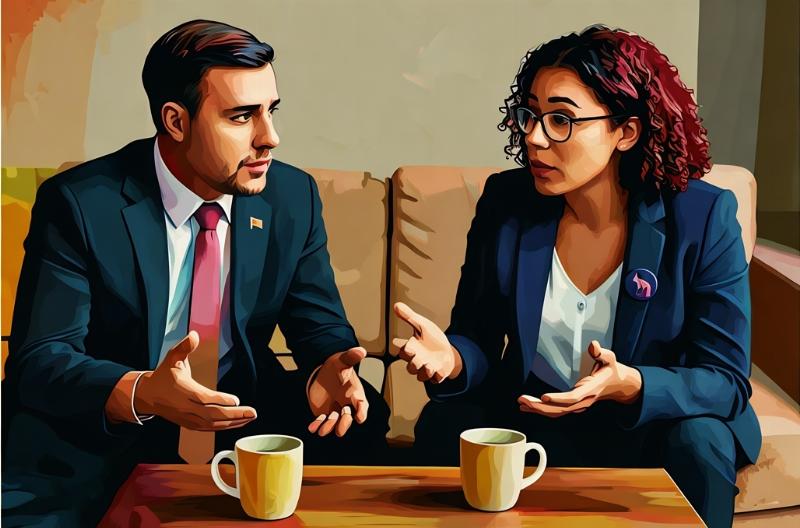


Rob Schneider recently posted online his thoughts about our conversations. He suggested that we need to add friction to our conversations. In other words, we shouldn’t avoid non-violent conflict in our conversations, or for that matter, in our interactions and relationships.
He’s right. Furthermore, the Founding Fathers of our nation would agree.

Image created using AI.
That conflict could mean something positive may sound absurd on its face. It really depends on the context and particular situations. Motivational speaker Thomas Crum has written about how conflict is beneficial in his book, The Magic of Conflict. I have attended one of his seminars, Crum uses Aikido to demonstrate the concept of functional conflict. He puts on a very convincing display.
Functional conflict is a type of conflict that can result in positive results. It’s not violence; it is, instead, the necessary antidote to Groupthink.
A website lists 30 Ways to Resist Groupthink. You can find the article here. I could list them all, but it’s safe to say that, like Paul Simon’s Thirty Ways to Leave Your Lover, they all involve the same means—conflict.
Groupthink is a term coined by social psychologist Irving Janis (1972), and he defined it as:
… occurring when a group makes faulty decisions because group pressures lead to a deterioration of “mental efficiency, reality testing, and moral judgment”. Furthermore, groups affected by groupthink ignore alternatives and tend to take irrational actions that dehumanize other groups.
Without getting into the details, Janis listed eight symptoms of groupthink:
Illusion of invulnerability, Collective rationalization, Belief in inherent morality, Stereotyped views of out-groups, Direct pressure on dissenters, Self-censorship, Illusion of unanimity, and Self-appointed ‘mindguards.’
We see this often in political situations and social events. Recently, Secretary of Health and Human Services Robert F. Kennedy was subjected to an assault of groupthink in action. Many of the Senators questioning him in a hearing had no interest in solving anything except scoring political points for public consumption.
Anyone who watched the hearing could see the signs of groupthink at work. Shouting down any dissent, not allowing the secretary to be heard over shouting, the arrogant chest pounding and pretense of moral superiority, the placing of direct pressure for him to conform, and their aggressive behavior broadcasting what they believe is their moral superiority. The symptoms of groupthink were clearly on display. And the result of all this was in the minds of many as nothing except a failed attempt to discredit Mr. Kennedy.
Groupthink is a malady that affects group decision-making. The politicization of groupthink is used to control much the same way as a virus set loose on the public. Sound familiar? Isn’t that what we saw with the Covid shutdowns? People were admonished for not wearing a mask or failing to social distance, forced to stay sheltered, and bullied into taking the covid vaccine. In fact, the vaccine was made a mandate and not a choice. Those who failed to conform were punished. That was consistent with two symptoms of groupthink: Direct pressure on dissenters by self-appointed ‘mindguards.’ We can add their belief in inherent morality or moral superiority.
Rob Schneider’s suggestion of “adding friction” to our conversation invites debate. As I stated earlier, the founding fathers of our country knew that groupthink would be a problem long before Irving Janis even existed. They put safeguards against it in the form of the United States Constitution and how they set up our government.
We can begin with the First Amendment. Among its purposes is to allow the free exchange of ideas. It encourages disagreement by its very nature.
The Electoral College itself exists because we are a constitutional republic, not simply a democracy. It ensures that the voice of the minority is not drowned out by the majority.
There is a system of checks and balances between the Legislative, Executive, and Judicial branches of our government. This allows for co-equal branches. No one branch can have ultimate control.
Even the way our laws are passed and decision-making has inherent defenses against groupthink. The way Congress passes bills has safeguards against the suppression of minority voices. Rules are set up with majority requirements, super-majority requirements, and two-thirds majority in certain cases. Then, not long after the Constitution and Bill of Rights were ratified, Congress went further, adding the filibuster, which the Senate defines this way:
The Senate tradition of unlimited debate has allowed for the use of the filibuster, a loosely defined term for action designed to prolong debate and delay or prevent a vote on a bill, resolution, amendment, or other debatable question.
This, again, ensures that the voice of the minority is heard.
All these aspects of our Constitution and government rules are designed to encourage debate. In other words, our system encourages conflict. Specifically, functional conflict, which is the antidote to groupthink.
Unfortunately, the Democrat party has been attempting to eliminate things such as the Electoral College, the filibuster, and the strength of the First Amendment.
Rob Schneider’s “adding friction” to conversation is consistent with the Founding Fathers’ basic concept known as The United States of America. When asked what the Founders had wrought, Benjamin Franklin responded, “A Republic, if we can keep it” —but we won’t if the Democrats have their way.
